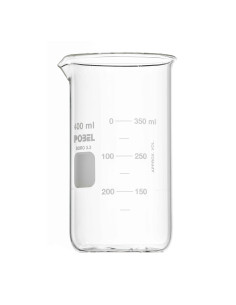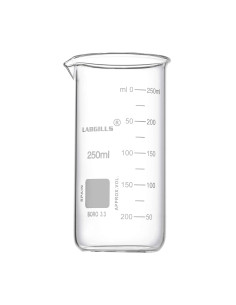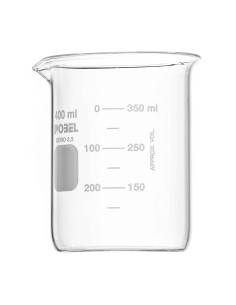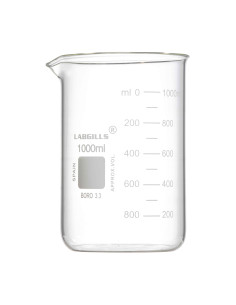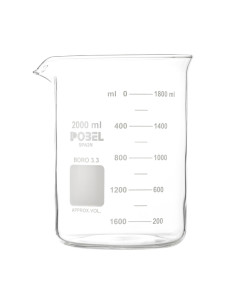LABORATORY GLASS BEAKERS
Technical Features and Advantages of Laboratory Glass Beakers
Laboratory glass beakers—also known as laboratory crystal beakers—are made from borosilicate glass 3.3, a material that combines silica and boron oxide to achieve a very low linear thermal expansion coefficient. This property gives them excellent resistance to thermal shocks up to 200 °C and continuous temperatures close to 500 °C, allowing them to go directly from a Bunsen burner to an ice bath without cracks or internal stresses. Additionally, borosilicate is virtually inert to most acids, bases, and organic solvents, which minimizes cross-contamination and extends the beaker's service life for years.
One of the key factors behind these vessels' success is their absolute optical clarity: the crystalline wall allows clear observation of precipitate formation, gas evolution, or color changes during reactions, without distortions that could lead to erroneous readings. Each unit features a spout that is hot-formed—rather than added afterward—which directs the pour and prevents dripping. The scale is screen-printed with ceramic ink, ensuring long-lasting volume references even after multiple dishwasher or autoclave cycles.
Available Sizes and Formats: Find the Exact Model for Your Protocol
At Pobel, we offer a catalog of laboratory beakers ranging from 10 ml to 5 l, ensuring options for both small-scale titrations and pilot production batches. The Griffin beaker, with its low profile and wide mouth, is the preferred format for heating solutions and collecting filtrates using filter paper or Büchner funnels; the wide opening speeds up evaporation and facilitates stirring with a rod or magnetic stirrer.
All models feature a reinforced rim formed by a rolling process, strengthening the area most exposed to impacts during handling. For work in controlled atmospheres, we offer versions with ground-glass necks that accommodate stoppers, condensers, or rubber adapters without the need for grease seals. Beakers without graduations—recommended for tests where markings could interfere with visual observations—are manufactured with the same uniform wall thickness as graduated models, ensuring identical robustness.
Applications in Chemistry, Biology, and Industry: A Versatile Ally
The borosilicate beaker has become a workhorse in analytical chemistry, microbiology, pharmacology, and quality control laboratories. It serves as a temporary container during precision balance weighing, as a reaction chamber for reflux organic synthesis, and as a filtrate collector before transfer to volumetric flasks. Its compatibility with stirring hot plates allows buffer solutions to be maintained at constant temperatures during culture incubation, while its dimensional stability withstands repeated autoclave cycles without deforming or losing transparency.
In industrial settings, pilot plants for detergents or cosmetics use large-volume beakers to validate formulations with surfactants or essential oils—materials that would require costly and less transparent metal containers. Food R&D departments employ 250 ml and 400 ml beakers to measure emulsion stability, check protein flocculation, or assess pH after adding acidity regulators. Even in educational environments, their durability reduces replacement needs and helps maintain long-term equipment investments.
Reinforced Borosilicate: Pobel's Choice for Maximum Safety and Purity
In environments where mechanical failure could compromise entire series of analyses—such as pilot synthesis lines, stability studies, or teaching labs using corrosive reagents—Pobel recommends reinforced borosilicate 3.3. It is manufactured with strict thickness control and an annealing process that virtually eliminates internal stresses in the glass. The result is a beaker that withstands thermal shocks over 200 °C and repeated autoclave cycles without losing transparency or dimensional accuracy.
While alternatives like plastic lab beakers offer lightweight convenience, Pobel’s borosilicate ensures maximum chemical inertness against strong acids, concentrated bases, and hot organic solvents. Additionally, its ultra-smooth, fire-polished surface minimizes analyte adsorption and facilitates cleaning—a critical advantage in quality control labs and research where trace contamination can distort results.
Each beaker is cast and molded in a single operation, ensuring the spout is part of the structure rather than an added piece. This design prevents microcracks and ensures uniform flow during transfers, even after hundreds of heating cycles. For protocols requiring inert atmospheres or vacuum lines, we offer versions with standard DIN ground-glass necks, compatible with glass stoppers or PTFE adapters, enabling the beaker to be integrated into complex assemblies without the need for grease seals.
If your procedure combines extreme temperatures, aggressive solvents, and frequent handling, Pobel’s reinforced borosilicate is the choice that protects not only sample integrity but also your long-term budget by minimizing replacements due to breakage or wear. Our technical team is available to compare thicknesses, diameters, and special configurations and, based on your workflow, recommend the model that best balances durability, ergonomics, and operational cost.
How to Choose the Right Beaker and Request Your Quote from Pobel
Selecting the correct volume, geometry, and material saves time, reagents, and replacements. That’s why at Pobel we don’t just list references: we analyze your workflow, maximum process temperature, chemical aggressiveness of reagents, and compatibility with your stirring or heating system. With that information, we prepare a detailed proposal including technical datasheets, ISO 3819 compliance certificates, and typical lead times.
For specialized advice, simply fill out the contact form available in this category or the contact section, or email us with your batch numbers, volume ranges, and regulatory requirements. One of our technicians will personally respond and guide you in selecting the laboratory glass beaker—or plastic beaker if you prefer—that will turn your purchase into a durable and cost-effective investment.
Explore our collection now and discover why thousands of research centers trust Pobel glassware to achieve reproducible, safe, and accurate results.




